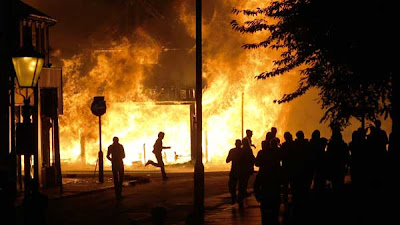Chances are that if you attended a major music festival in North America this summer, you witnessed a now canonical alt-rock artist playing through one of their seminal albums in its entirity. This past April I saw the Pixies perform their third (and best) album, Doolittle; and, more recently, I saw the Flaming Lips perform their 1999 album, The Soft Bulletin, at the Osheaga Music Festival in Montreal. Believe it or not, the "album concert" trend has been in full swing for a number of years. My best guess as to how it began involves Don't Look Back, an annual series of concerts that began in 2005, where London-based promoters All Tomorrow's Parties ask artists to play through their most celebrated albums in a live setting. The most well-known festivals with stages hosted by ATP are Barcelona's Primavera Sound festival and the Pitchfork Music Festival in Chicago.
As a fan who holds some loyalty to the formal constraints of the LP, I've been pleasantly surprised by the amount of artists who've taken up the idea and are currently using it as a touring strategy. In the case of the Pixies (a band I've now seen three times), seeing them perform their best album in its entirety was good enough incentive to see them again. There are always tracks that bands never (if rarely) perform live, and I was sure the Pixies wouldn't simply end their set after they were done playing through a forty-five minute album. I was right: not only did they play through a bunch of b-sides as a "warm-up" for the album, they followed Doolittle with an assortment of fan favourites. In the end, it was money well spent.
But it's worth asking why this trend in concerts continues to gather steam? Of course, such sentiments are pretty common among music fans from my generation. Not only does my demographic still have enough disposable income to pay for extraneous concerts, most of us gained an appreciation for popular music just as the LP format was on it's way out. For this reason, the British music critic Simon Reynolds is right to lament the current appetite for nostalgia in popular music. Reynold's new book, which I have not yet read, is full of insights into why music from a bygone era continues to take hold of popular imagination.
In a recent article for Slate, Reynolds offers a fair, if not overly grim, indictment of the pop music's current attachment to the '90s, arguing that we're witnessing an ever shortening gap between present trends in music and a detached, apolitical (i.e. nostalgic) appreciation of the past. It's become very apparent (from the growing numbers of new indie bands aspiring to the grungy sounds of bands like the Smashing Pumpkins and Nirvana, to the resurgence of plaid, baggy t-shirts, shows like Portlandia (above), and novels by David Foster Wallace) that the nineties are back in full force. But did they ever really go away? I know I can't speak for everyone who's currently lapping up nineties nostalgia, but ask any of my friends and they'll tell you that I've been loyal to early nineties zeitgeist since junior high (1999-2001). Still, I have to agree with Reynolds when he suggests that
an undercurrent to grunge retrospection is the music media's and record industry's own nostalgia for the heyday of the rock monoculture. It was already crumbling in the early '90s, thanks to rap (the rebel music of black youth, obviously, but a lot of white kids had defected to hip-hop, too) and to the emergence of rave and electronic dance culture (in America destined always to be a minority subculture, but in Europe the dominant form of '90s pop). Grunge was the last blast of rock as a force at once central in popular culture yet also running counter to mainstream show biz values.Reynolds would be the first to admit that nostalgia and popular music are inseparable--indeed, such retrospection is not only vital to the well-being of high-powered business execs, it usually works at a local level as well. It's also necessary to address the troubled relation to the past that defined gen-x culture: not simply a break from the past failures (whether they be associated with the music of babyboomers or their drawn-out depoliticization since the sixties), but a new sense of optimism and faith in the free market, dot-coms, and American expansion. I'm wondering, in other words, whether there's a certain kind of nostalgia that the nineties, in their burgeoning diversity (what Reynolds sees as a "crumbling rock monoculture") helped condition; how did particular cultural productions of the decade mediate the past, and why are such mediations now attracting a new audience? I suppose I'll just have to read Reynolds' book and see for myself.



